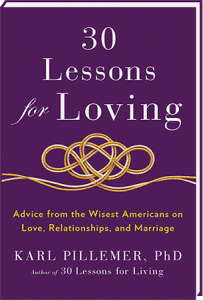 Love and marriage aren’t typical topics that come to mind when you think about evidence. But Cornell gerontologist and EBL-founder Karl Pillemer found a way to use data to distill the best advice about love, relationships, and marriage.
Love and marriage aren’t typical topics that come to mind when you think about evidence. But Cornell gerontologist and EBL-founder Karl Pillemer found a way to use data to distill the best advice about love, relationships, and marriage.
In his new book, 30 Lessons for Loving, Karl used social science research methods, to conduct in-depth interview with more than 700 older Americans on the topic of love and marriage. His Marriage Advice Project also conducted a national survey of individuals age 65 and older who were selected at random.
“The end result was a large, highly diverse sample, racially, ethnically, economically, and geographically,” Karl said. “My goal wasn’t to get a handful of stories; it was to get a large enough sample that I could rely on the ‘wisdom of crowds’ in determining the major lessons for younger people about getting and staying married in a complex and difficult world.”
Based on these interviews, he distilled their advice into 30 lessons to help about finding a lifelong mate and keeping a relationships strong. Here are some nuggets for advice from the book:
- Marry someone a lot like you. Although we often hear the expression “opposites attract,” when it comes to marriage, it’s best to look for someone who shares your basic values.
- It’s important to use the same good manners with your spouse as you would with a friend or work colleague.
- Children and in-laws can have a big impact on marriage, but it’s most important to put your spouse first.
- Don’t underestimate the power of a single negative interaction. It takes many positive acts to outweigh a single argument or insult.
“The elders in the book are looking back from the finish line; it’s no longer a mystery how things are going to turn out,” Karl said. “These are people who’ve been through just about everything that keeps young people awake at night, and they’re still doing okay. They’re living examples that a lot of what we worry about is actually resolvable—that with resilience, drive, and flexibility, you can still be happy, even though bad things sometimes happen to you.”



Speak Your Mind